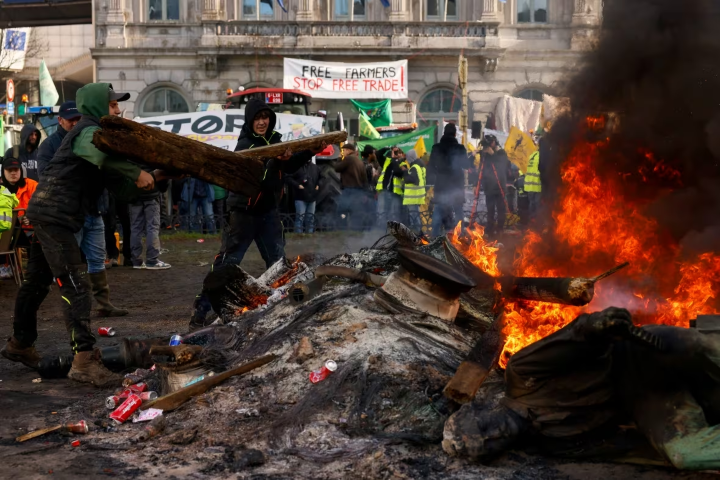
Farmers gathered in protest outside the European Parliament in Brussels on Thursday while European leaders convened for a summit. During the summit, a consensus was reached on a fresh aid package for Ukraine. (Photo by Thomas Padilla/The Associated Press)
Farmers' protests that ignited in France in mid-January have now rippled across Europe, as agricultural communities rally against bureaucratic hurdles and strive to safeguard their livelihoods amidst the continent's escalating cost of living.
The demonstrations reached a boiling point outside the European Union's headquarters in Brussels, disrupting a summit attended by EU leaders. In response to new government measures, two major French farmers' unions temporarily halted nationwide blockades.
In Brussels, a convoy of approximately 1,300 heavy-duty tractors paraded through the streets, causing traffic chaos as farmers sounded horns to draw attention to their struggles. Some resorted to burning tires, throwing stones, and even pelting eggs, while others sought warmth around fires in front of the European Parliament.
Joining forces with their French counterparts, farmers from Italy, Spain, and other European nations organized similar protests in their respective countries. In Portugal, farmers ventured to the Spanish border at dawn, obstructing roads linking the two nations. Notably, signs of unrest have also emerged recently in Poland, Greece, and Germany.
The primary grievances voiced by the EU's largest farmers' groups include the perceived undermining of crop profitability due to environmental regulations imposed by Brussels and excessive regulatory constraints. Additionally, the surging costs of fertilizers and fuel, exacerbated by geopolitical events such as Russia's invasion of Ukraine two years ago, have further strained farmers' economic viability. Unfair foreign competition, particularly from Ukraine in the case of Poland, has been another point of contention.
To alleviate tensions, French Prime Minister Gabriel Attal announced emergency measures, including financial aid and tax breaks, totalling 400 million euros plus 200 million euros in cash advances. Attal firmly rejected the prospect of a trade deal with South America's Mercosur bloc, citing concerns over the use of prohibited substances in those countries.
In a bid to address farmers' concerns, Attal pledged to intensify safety checks on food imports and refrain from imposing regulations stricter than EU standards. The farmers' unions cautiously welcomed the government's promises, albeit with a three-week deadline for tangible progress before the Paris International Agricultural Show.
While France's major farmers' unions decided to lift country-wide blockades after the prime minister's announcement, some activist farmers insisted on waiting to see the commitments in writing before dispersing. The unions emphasized their vigilance and commitment to monitor the government's implementation of promises.
Meanwhile, the European Commission proposed an "emergency brake" to limit agricultural imports from Ukraine, particularly poultry, eggs, and sugar. However, farmers argue that the proposed volume remains too high. Discontent with new EU subsidy rules, such as the obligation to leave a percentage of farmland fallow, has also fueled tensions.
In response, the commission granted EU farmers a waiver from the fallow requirement for the current year, allowing them to receive support payments while growing crops without pesticides.















